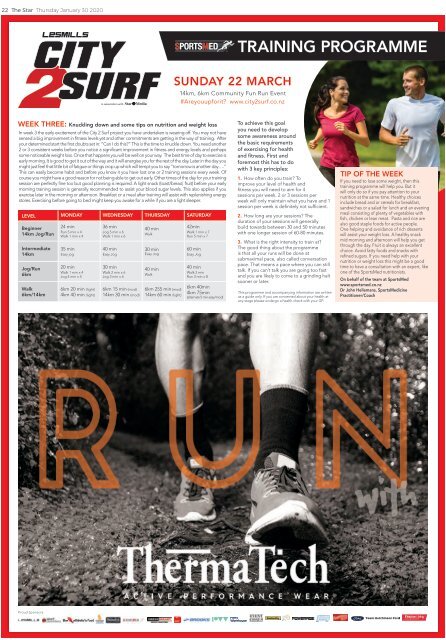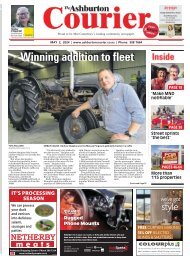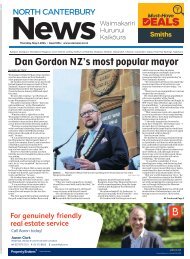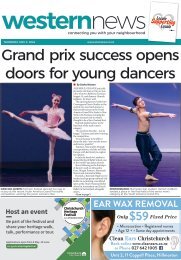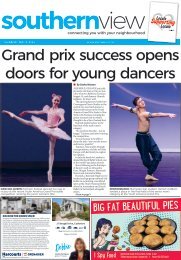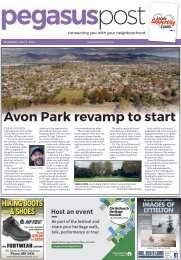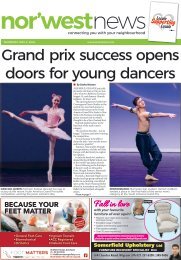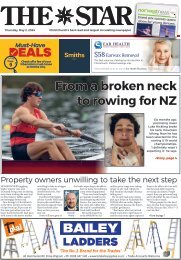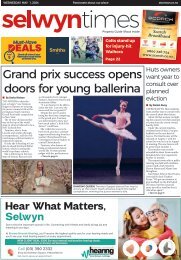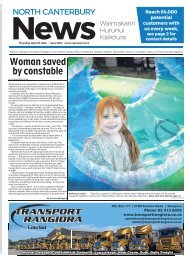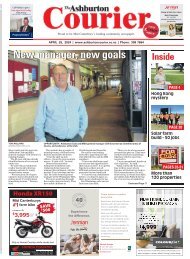The Star: January 30, 2020
You also want an ePaper? Increase the reach of your titles
YUMPU automatically turns print PDFs into web optimized ePapers that Google loves.
1<br />
22 <strong>The</strong> <strong>Star</strong> Thursday <strong>January</strong> <strong>30</strong> <strong>2020</strong><br />
TraInInG ProGraMMe<br />
Sunday 22 March<br />
14km, 6km Community Fun Run Event<br />
#Areyouupforit? www.city2surf.co.nz<br />
weeK Three: Knuckling down and some tips on nutrition and weight loss<br />
In week 3 the early excitement of the City 2 Surf project you have undertaken is wearing off. You may not have<br />
sensed a big improvement in fitness levels yet and other commitments are getting in the way of training. After<br />
your determined start the first doubts set in: “Can I do this?” This is the time to knuckle down. You need another<br />
2 or 3 consistent weeks before you notice a significant improvement in fitness and energy levels and perhaps<br />
some noticeable weight loss. Once that happens you will be well on your way. <strong>The</strong> best time of day to exercise is<br />
early morning. It is good to get it out of the way and it will energise you for the rest of the day. Later in the day you<br />
might just feel that little bit of fatigue or things crop up which will tempt you to say “tomorrow is another day….”<br />
This can easily become habit and before you know it you have lost one or 2 training sessions every week. Of<br />
course you might have a good reason for not being able to get out early. Other times of the day for your training<br />
session are perfectly fine too but good planning is required. A light snack (toast/bread, fruit) before your early<br />
morning training session is generally recommended to assist your blood sugar levels. This also applies if you<br />
exercise later in the morning or afternoon. Breakfast or a meal after training will assist with replenishing energy<br />
stores. Exercising before going to bed might keep you awake for a while if you are a light sleeper.<br />
LeveL Monday wedneSday ThurSday SaTurday<br />
Beginner<br />
14km Jog/run<br />
Intermediate<br />
14km<br />
Jog/run<br />
6km<br />
walk<br />
6km/14km<br />
24 min<br />
Run 5 min x 4<br />
Walk 1 min x 4<br />
35 min<br />
Easy jog<br />
20 min<br />
Walk 1 min x 4<br />
Jog 4 min x 4<br />
6km 20 min (light)<br />
4km 40 min (light)<br />
36 min<br />
Jog 5 min x 6<br />
Walk 1 min x 6<br />
40 min<br />
Easy Jog<br />
<strong>30</strong> min<br />
Walk 2 min x 6<br />
Jog 3 min x 6<br />
6km 15 min (mod)<br />
14km <strong>30</strong> min (mod)<br />
40 min<br />
Walk<br />
<strong>30</strong> min<br />
Easy Jog<br />
40 min<br />
Walk<br />
6km 255 min (mod)<br />
14km 60 min (light)<br />
42min<br />
Walk 1 min x 7<br />
Run 5 min x 7<br />
60 min<br />
Easy Jog<br />
40 min<br />
Walk 2 min<br />
Run 3 min x 8<br />
6km 40min<br />
4km 75min<br />
(alternate 5 min easy/mod)<br />
To achieve this goal<br />
you need to develop<br />
some awareness around<br />
the basic requirements<br />
of exercising for health<br />
and fitness. First and<br />
foremost this has to do<br />
with 3 key principles:<br />
1. How often do you train? To<br />
improve your level of health and<br />
fitness you will need to aim for 4<br />
sessions per week. 2 or 3 sessions per<br />
week will only maintain what you have and 1<br />
session per week is definitely not sufficient.<br />
2. How long are your sessions? <strong>The</strong><br />
duration of your sessions will generally<br />
build towards between <strong>30</strong> and 50 minutes<br />
with one longer session of 60-80 minutes.<br />
3. What is the right intensity to train at?<br />
<strong>The</strong> good thing about the programme<br />
is that all your runs will be done at<br />
submaximal pace, also called conversation<br />
pace. That means a pace where you can still<br />
talk. If you can’t talk you are going too fast<br />
and you are likely to come to a grinding halt<br />
sooner or later.<br />
This programme and accompanying information are written<br />
as a guide only. If you are concerned about your health at<br />
any stage please undergo a health check with your GP.<br />
TIP oF <strong>The</strong> weeK<br />
If you need to lose some weight, then this<br />
training programme will help you. But it<br />
will only do so if you pay attention to your<br />
nutrition at the same time. Healthy choices<br />
include bread and or cereals for breakfast,<br />
sandwiches or a salad for lunch and an evening<br />
meal consisting of plenty of vegetables with<br />
fish, chicken or lean meat. Pasta and rice are<br />
also good staple foods for active people.<br />
One helping and avoidance of rich desserts<br />
will assist your weight loss. A healthy snack<br />
mid morning and afternoon will help you get<br />
through the day. Fruit is always an excellent<br />
choice. Avoid fatty foods and snacks with<br />
refined sugars. If you need help with your<br />
nutrition or weight loss this might be a good<br />
time to have a consultation with an expert, like<br />
one of the SportsMed nutritionists.<br />
on behalf of the team at SportsMed<br />
www.sportsmed.co.nz<br />
dr John hellemans, SportsMedicine<br />
Practitioner/coach<br />
SINGAPORE AIRLINES<br />
BRAND GUIDELINES<br />
SUMMARY<br />
Proud Sponsors


